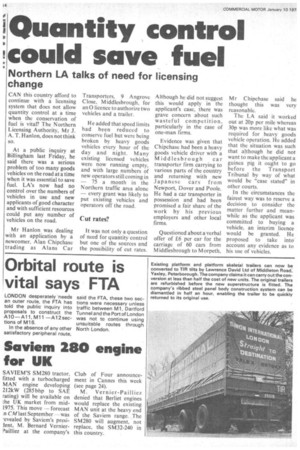Quantity control could save fuel
Page 16

If you've noticed an error in this article please click here to report it so we can fix it.
Northern LA talks of need for licensing change
CAN this country afford to continue with a licensing system that does not allow quantity control at a time when the conservation of fuel is vital? The Northern Licensing Authority, Mr J. A. T. Hanlon, does not think so.
At a public inquiry at Billingham last Friday, he said there was a serious problem of too many goods vehicles on the road at a time when it was essential to save fuel. LA's now had no control over the numbers of vehicles in use and new applicants of good character and with sufficient resources could put any number of vehicles on the road.
Mr Hanlon was dealing with an application by a newcomer, Alan Chipchase trading as Alans Car Transporters, 9 Angrove Close. Middlesbrough, for an 0 licence to authorize two vehicles and a trailer.
He added that speed limits had been reduced to conserve fuel but were being broken by heavy goods vehicles every hour of the day and night. Many existing licensed vehicles were now running empty, and with large numbers of new operators still coming in — 75 a month in the Northern traffic area alone — every grant was likely to put existing vehicles and operators off the road.
Cut rates?
It was not only a question of need for quantity control but one of the sources and the possibility of cut rates. Although he did not suggest this would apply in the applicant's case, there was grave concern about such wasteful competition, particularly in the case of one-man firms.
Evidence was given that Chipchase had been a heavy goods vehicle driver with a Middlesbrough car transporter firm carrying to various parts of the country and returning with new Japanese cars from Newport, Dover and Poole. He had a car transporter in possession and had been promised a fair share of the work by his previous employers and other local firms.
Questioned about a verbal offer of £6 per car for the carriage of 60 cars from Middlesbrough to M orpeth, Mr Chipchase said he thought this was very reasonable.
The LA said it worked out at 20p per mile whereas 30p was more like what was required for heavy goods vehicle operation. He added that the situation was such that although he did not want to make the applicant a guinea pig it ought to go before the Transport Tribunal by way of what would be "case stated" in other courts.
In the circumstances the fairest way was to reserve a decision to consider the matter further and meanwhile as the applicant was committed to buying a vehicle, an interim licence would be granted. Fle proposed to take into account any evidence as to his use of vehicles.




































































































